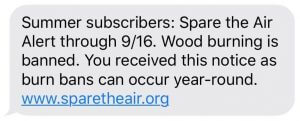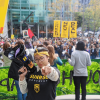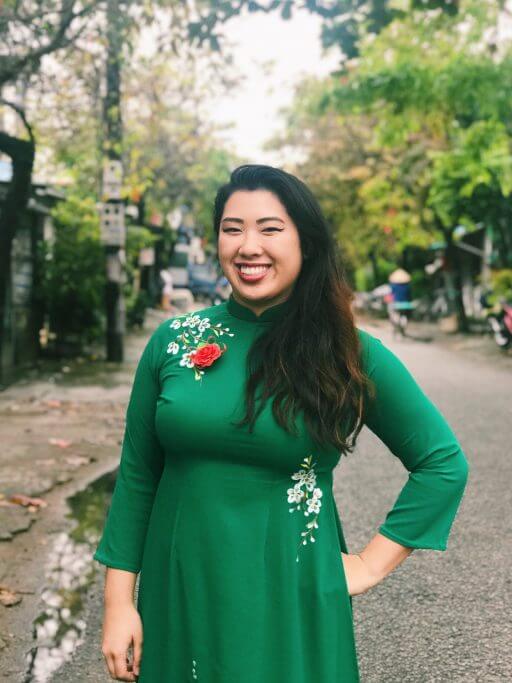Advancing Racial Justice
Megan Nguyen is the recipient of River Network’s 2020 Emerging Leader Award. Watch “Finding My Voice”.
Climate Justice = Racial Justice
Climate change affects everyone on this planet, especially marginalized communities. Racial and ethnic minorities will experience negative climate change impacts first and the worst.
In my home state of California—and the entire West Coast—we are suffering from catastrophic wildfires that are destroying homes and lives. As I’m writing this, I haven’t been able to see the sun in a few days or go outside without being exposed to hazardous air quality because of the wildfire smoke. Every day for the last 30 days, I’ve received a notice on my phone that it’s “Spare the Air” Day in California, a record-breaking streak we shouldn’t be proud of.

I’ve gotten an alert like this every day for the last 30 days – Megan
A 2018, University of Washington study showed communities that are majority Black, Hispanic, or Native American are over 50 percent more vulnerable to wildfire compared to other communities.
Why is it important to talk about climate change and racial justice? Because in order to fight the climate crisis, we need to build a cross-class and cross-racial movement.
Group Processing and Discussion
Last month, River Network hosted the Advancing Racial Justice coffee roundtable workshop. Roughly 90 water professionals from around the country participated in the conversation, which first began during River Rally 2020 in reaction to the murder of George Floyd and the incident with Chris Cooper, a birder in New York who was racially profiled. The need to continue having these conversations was further illuminated with the recent incident in Kenosha, Wisconsin, where cops shot Jacob Blake seven times in the back.
The purpose of the coffee roundtable gathering was to create a safe caucus for leaders across the national network of water professionals to process these events and provide each other support in bringing racial equity work to our workplaces. But of course, one hour is not nearly enough time to begin to understand the complexities of racial justice work.
Confronting My Identities

Note from the author: “I want to mention that I am not an expert on racial equity work but I’m speaking from my lived experience as a person of color and as someone who has been through several diversity trainings and workshops. I hope sharing my personal experience and vulnerability will help other folks in a similar position.”
Like many of you, I’ve had difficult conversations about race with my friends, family, and even myself. I recognized that my identity as a Chinese-Vietnamese Asian American plays a huge role in my work and personal life. With this identity, I’ve come to realize that I simultaneously hold levels of both privilege and oppression.

Megan wearing a traditional Vietnamese dress called an “ao dai.” Photo was taken in Hue, Vietnam courtesy of Megan Nguyen
Understanding how I can use my privilege to provide access for others and recognize oppression to take up more space has guided my learning. For example, my identities of privilege include that I am able-bodied, college educated, neuro-typical, US citizen, and fluent English speaker. Recognizing these identities in my outreach roles has made me become more aware of the way we train people and share information to the public because of different learning and comprehension abilities.
On the other hand, my identities of oppression—to name a few—include being an Asian woman in a conservation field dominated by white people, coming from a low-income economic background, and navigating a hetero-normative society as a queer person. These identities fall into the marginalized and excluded categories and as a result, I have experienced uncomfortable situations, been denied access to spaces, and faced judgement because of them. Understanding why these experiences happen encouraged me to seek and advocate for building a more inclusive space and using inclusive language to prevent it from happening to others.
In my anti-racist journey through the Sunrise Movement and CalTrout Justice Equity Diversity and Inclusion (JEDI) work, I found that learning and identifying the four levels of oppression: internalized, interpersonal, institiutionalized, and ideological – has helped me better understand how these systems show up in my life in relation to my identities and how to move past them.
I can’t change my identities but I can control how I use them to fight against oppression. I want to share this framework in hopes it will help others on a similar path.
The Four Levels of Oppression
Let’s define the Four “I’s” of Oppression:
- Internalized: When an individual absorbs the layered forms of oppression and uses it (usually unconsciously) against themselves, against members of their own group, or to inform biases they hold against others.
- Interpersonal: When a member of an included group feels justified in harming or degrading the dignity of a member of an excluded group … or doesn’t even notice that they are having such impact, interpersonal oppression is occurring.
- Institutionalized: The manifestation of ideological oppression in the dominant structures of society — when laws, the criminal legal system, the education system, politics & policy, media, the medical system, etc. create or maintain advantages for members of the included group(s), and disadvantage members of the excluded group(s).
- Ideological: The set of ideas that one group of people is somehow better than another, and has the right to control, exploit, or mistreat the other groups of people.
The Four “I’s” of Oppression Framework has been incredibly useful for my own learning and would encourage folks to reflect on the multiple identities you hold and the ways in which they are a source of privilege or oppression. This is above all a personal journey of self reflection and learning.

Note from the author: “This journey might be uncomfortable and that is okay. Keep in mind that what white people may perceive as a “learning experience,” for a person of color it is yet another confrontation with racial microaggressions and trauma. It is neither BIPOC folks’ duty nor obligation to educate white people on anything about race. The responsibility rests on white allies to educate themselves.”
Self Education & Reflection Resources
If you want to continue this work, there are numerous consultant agencies, workshops, books, and guides available online. A great place to start is River Network’s Equity, Diversity, Inclusion, and Racial Justice Resources for Nonprofits page.
Regardless of where your own learning journey takes you, I’d like to offer you some reflection questions adapted from Melissa Johnson Hewitt from Forward Movement Consulting, to help you ponder your efforts to advance racial justice in your personal life and organizational work.
- What are your core beliefs around racial equity? What frameworks do you use to begin envisioning this belief system from theory to action?
- How do your personal values and organizational values (how you lead your life and work) inform your understanding of advocacy and challenging the status quo?
- What spaces and opportunities are available to you within your organization to begin putting this work into action?
- What is important in your organization and the way you work with your colleagues?
- Are there any crucial boundaries you have around the work you do? What are they, and how do you articulate them?
Upcoming Events
Save the date: join River Network and our Leaders of Color Committee for our first ever career panel on October 7th at 4pm PT! The focus for our first panel will be young professionals of color in the environmental space and include those with experience in communications, program management and science and field work. Register here. We hope to see you there!
River Network has created a Leaders of Color Committee. If you’d like to join and help plan more BIPOC workshops and events, contact Sheyda Esnaashari at sesnaashari@rivernetwork.org.
The next coffee roundtable sessions will be held throughout October and November 2020. Find the latest information here and register for the second Advancing Racial Justice roundtable, scheduled for November 18.
-
[…] staff and working toward internal DEI efforts. Through these communities, including the continuing “Advancing Racial Justice” conversation series, I was able to talk to other water professionals who had been addressing racial […]
Leave a Comment






Honestly, this is so well written. I keep coming back to this as a reference to learn and reflect.
This topic and conversation are so important.